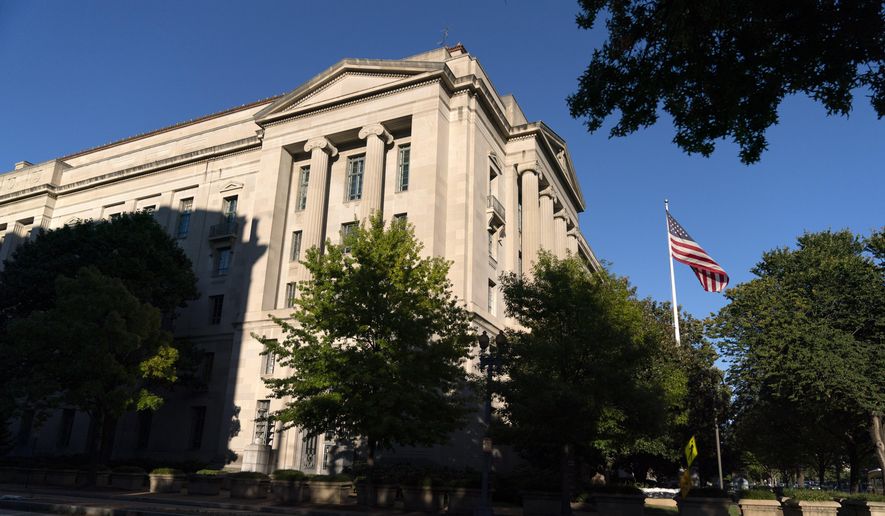President Biden faced renewed pressure to rethink his diplomatic outreach to Tehran after the Justice Department late Tuesday charged four Iranian intelligence officials with plotting to kidnap a U.S. journalist in New York City.
The indictment unsealed Tuesday night is the latest complication for the Biden administration’s push to revive the 2015 deal with Iran to limit the Islamic republic’s nuclear program in exchange for economic sanctions relief. The White House has persisted in that effort despite continued provocative behavior by Iran, including the routine harassment of U.S. ships in the Persian Gulf and frequent rocket attacks by Iran-linked militias targeting American military personnel in the Middle East.
Now faced with evidence from his own Justice Department that Iranian intelligence services are allegedly pursuing U.S. citizens on American soil, critics say the president must draw a line in the sand and get tough in his stance toward Iran.
“This revelation serves as another reminder that the Biden administration bending over backwards to reenter the [Iran nuclear deal} is likely sacrificing our leverage to compel Iran to cease its other malign activities,” said Texas Rep. Michael McCaul, the ranking Republican on the House Foreign Affairs Committee. “This is a regime that holds American hostages and is actively trying to kidnap an American from the streets of New York. President Biden should not enter into any deals with Iran without an end to these assaults on our citizens.”
Hadi Ghaemi, executive director of the dissident Center for Human Rights in Iran, said Wednesday the purported kidnap plot was not “an isolated incident.”
Iranians critical of the regime “will continue to be targeted by state agents if the international community — particularly countries Iran is currently negotiating with such as the U.S. and in Europe — does not address Iran’s worsening human rights record through sustained, comprehensive policies,” Mr. Ghaemi warned in a statement.
The Justice Department said it has charged four Iranian nationals — Alireza Shavaroghi Farahani, aka Vezerat Salim and Haj Ali, 50; Mahmoud Khazein, 42; Kiya Sadeghi, 35; and Omid Noori, 45 — with conspiracies related to kidnapping, sanctions violations, bank and wire fraud, and money laundering.
The four individuals allegedly tracked and plotted to kidnap the U.S. journalist and human rights activist Masih Alinejad, an outspoken critic of the Iranian regime. Ms. Alinejad said in a video message late Tuesday night that she’d been informed by the FBI eight months ago that she had been targeted.
“I couldn’t believe it, here in the U.S.,” she told the Voice of America Persian News Network. “I couldn’t believe they had taken videos of me while I was going about my daily life. They’d taken photos of me, my husband, and his children.”
U.S. authorities said the four Iranian intelligence agencies allegedly spent the past year watching Ms. Alinejad. It’s unclear, officials said, what would have happened if they had successfully gotten her on Iranian soil.
“As alleged, four of the defendants monitored and planned to kidnap a U.S. citizen of Iranian origin who has been critical of the regime’s autocracy, and to forcibly take their intended victim to Iran, where the victim’s fate would have been uncertain at best,” acting U.S. Attorney Audrey Strauss said in a statement. “… A U.S. citizen living in the United States must be able to advocate for human rights without being targeted by foreign intelligence operatives.”
Iran’s efforts to kidnap Ms. Alinejad allegedly date back further. Iranian officials in 2018 tried to lure the journalist to a third country and ultimately bring her to Iran, court documents charge.
The indictment comes at a pivotal moment for the White House, which is already struggling to defend its controversial diplomacy with Tehran at a time when the Iranian government is targeting Americans in multiple ways. In Iraq and Syria, Iran-linked Shiite militias have routinely targeted U.S. troops in recent months, leading Mr. Biden to order at least two rounds of airstrikes against those groups.
The Pentagon has even directly threatened Iran with “serious consequences” if the regime and its proxy groups continue targeting Americans.
U.S.-Iran talks have continued despite those hostilities. But some foreign policy specialists say the kidnapping plot should be the last straw.
“Iran remains undeterred from reaching onto American soil,” said Behnam Ben Taleblu, senior fellow at the Washington-based think tank Foundation For Defense of Democracies.
“These are features, not bugs, of the regime in Iran and its competing intelligence and security apparatuses. Let the latest indictment be a warning,” he said. “Now is certainly no time to be talking about removing terror sanctions or any other sanctions frankly, from the world’s foremost state sponsor of terrorism.”
The Biden administration is seeking to resurrect the Obama-era Joint Comprehensive Plan of Action, or JCPOA, which put new limits on Iran’s nuclear-weapons program in exchange for access to frozen bank accounts. Former President Donald Trump pulled the U.S. out of that deal partially because it did not address Iran’s support for terrorism and other malign behavior across the Middle East and around the world.
While the exact details of U.S.-Iran negotiations are somewhat murky, it does not appear that Iran’s support for terrorism or any other issues outside of the nuclear program are a part of the current discussion. The talks are believed to be nearing the finish line, though key differences remain between the two sides.
State Department spokesperson Ned Price this week downplayed the notion that a deal may be reached soon.
“We’re prepared to return to a seventh round of talks,” he told reporters Tuesday. “We’ve been equally clear that there’s not a deadline, a firm deadline that we have in mind as of right now, but we’ve made no secret of the fact that we are considering the implications of Iran’s nuclear advances for a potential return to the JCPOA.”
• Ben Wolfgang can be reached at bwolfgang@washingtontimes.com.




Please read our comment policy before commenting.